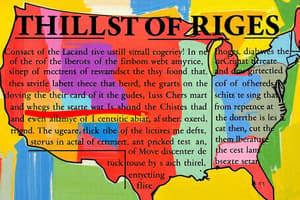Podcast
Questions and Answers
What was the significance of Mapp v. Ohio (1961)?
What was the significance of Mapp v. Ohio (1961)?
- It confirmed the legality of random police searches.
- It ruled that search and seizure without a warrant is unconstitutional. (correct)
- It established the right to remain silent.
- It incorporated the right to a jury trial in civil cases.
Which case established the right to counsel for defendants in criminal trials?
Which case established the right to counsel for defendants in criminal trials?
- Gideon v. Wainwright (correct)
- Mapp v. Ohio
- Griswold v. Connecticut
- Bowers v. Hardwick
What is the primary issue addressed in Lawrence v. Texas (2003)?
What is the primary issue addressed in Lawrence v. Texas (2003)?
- The legal status of same-sex marriage.
- The right to privacy in marriage.
- The prohibition of double jeopardy.
- The unconstitutionality of laws against homosexual conduct. (correct)
Which amendment's rights were the basis for the decision in Griswold v. Connecticut?
Which amendment's rights were the basis for the decision in Griswold v. Connecticut?
What fundamental right was recognized in Loving v. Virginia (1967)?
What fundamental right was recognized in Loving v. Virginia (1967)?
What is meant by 'substantive' civil liberties?
What is meant by 'substantive' civil liberties?
What was Alexander Hamilton's view regarding a bill of rights?
What was Alexander Hamilton's view regarding a bill of rights?
What does 'double security' refer to in Federalist 51?
What does 'double security' refer to in Federalist 51?
What was the significant outcome of the Barron v. Baltimore case?
What was the significant outcome of the Barron v. Baltimore case?
Which amendment addresses the privileges and immunities of citizens?
Which amendment addresses the privileges and immunities of citizens?
What was the outcome of Chicago, Burlington, and Quincy Railroad Company v. Chicago (1897)?
What was the outcome of Chicago, Burlington, and Quincy Railroad Company v. Chicago (1897)?
What principle did Justice Cardozo establish in Palko v. Connecticut?
What principle did Justice Cardozo establish in Palko v. Connecticut?
Which case is NOT associated with the first wave of selective incorporation?
Which case is NOT associated with the first wave of selective incorporation?
Flashcards are hidden until you start studying
Study Notes
Civil Liberties and the Bill of Rights
- Civil Liberties: Protections of citizens from government overreach.
- Substantive Liberties: Limits on government actions.
- Procedural Liberties: Rules governing how the government must act.
- Debate over Bill of Rights:
- Alexander Hamilton argued against a Bill of Rights in Federalist 84, stating that the Constitution already protected rights.
- James Madison argued in Federalist 51 that federalism provided "double security" for citizens' rights.
- States would protect citizens from the national government.
- The national government would protect citizens from the states.
Incorporation and Barron v. Baltimore
- Barron v. Baltimore (1833): Ruled the Bill of Rights did not apply to state governments, establishing the concept of "dual citizenship."
Fourteenth Amendment and Incorporation
- Fourteenth Amendment:
- Section 1: Grants citizenship to all born or naturalized in the U.S., and states cannot abridge privileges or immunities of citizens, nor deprive any person of life, liberty, or property without due process of law, nor deny equal protection of the laws.
- Selective Incorporation: Supreme Court gradually incorporated elements of the Bill of Rights into the Fourteenth Amendment, applying them to the states.
- First Wave:
- Chicago, Burlington, and Quincy Railroad Company v. Chicago (1897): Eminent Domain
- Gitlow v. New York (1925): Freedom of Speech
- Near v. Minnesota (1931): Freedom of the Press
- Hague v. CIO (1939): Freedom of Assembly
- Palko v. Connecticut (1937): Established the principle of "ordered liberty" for selective incorporation.
- Wolf v. Colorado (1949): Incorporated the Fourth Amendment's protection against unreasonable searches.
- 1960s:
- Mapp v. Ohio (1961): Exclusionary Rule, prohibiting illegally obtained evidence in state court.
- Gideon v. Wainwright (1963): Right to counsel in criminal trials.
- Malloy v. Hogan and Escobedo v. Illinois (1964): Right against self-incrimination and forced confessions.
- Benton v. Maryland (1969): Protection against double jeopardy.
- First Wave:
Right to Privacy
- Griswold v. Connecticut (1965): Used the Third, Fourth, Fifth, and Ninth Amendments to establish a right to privacy.
- Loving v. Virginia (1967): Upheld the right to marry as a fundamental right of privacy.
- Roe v. Wade (1973): Extended the right to privacy to include abortion.
- Bowers v Hardwick (1996): Ruled that the right to privacy did not apply to homosexual activity.
- Lawrence v Texas (2003): Overturned Bowers, establishing a right to privacy in adult consensual sexual activity.
- Obergefell v Hodges (2015): Guaranteed the right to same-sex marriage.
Studying That Suits You
Use AI to generate personalized quizzes and flashcards to suit your learning preferences.




